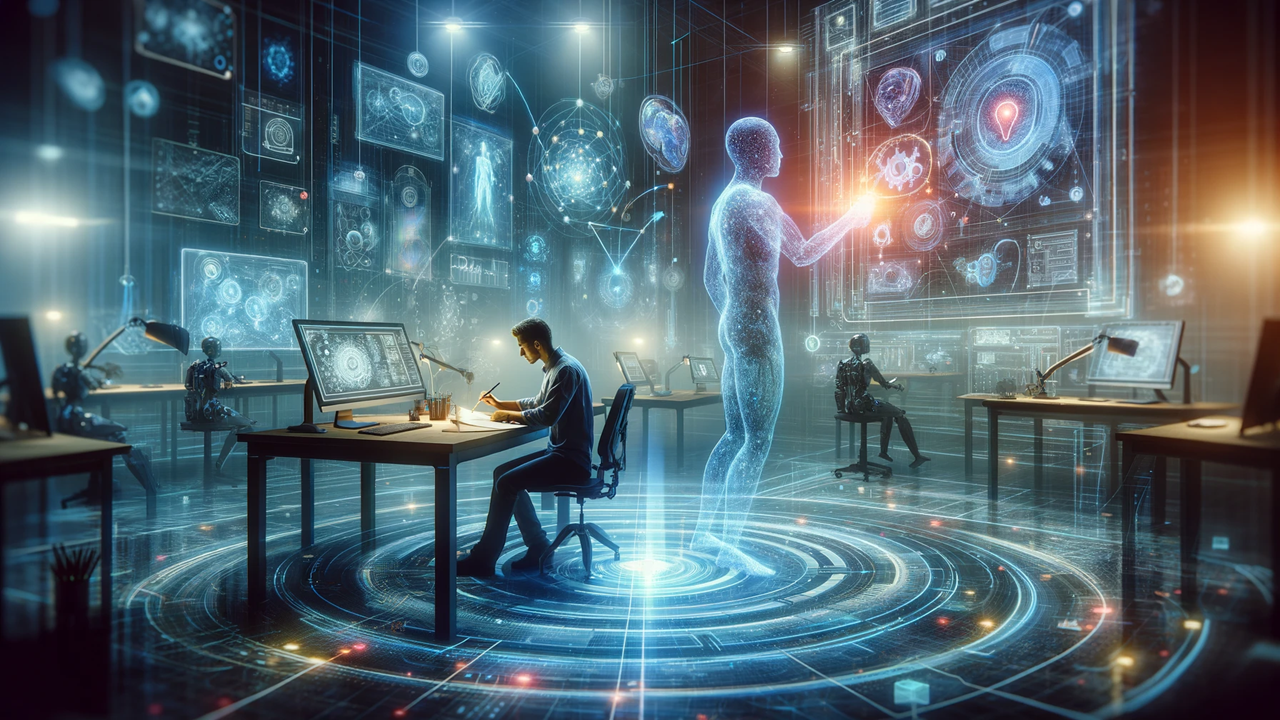The Digital Takeover: Navigating the Future of Human and Computer Collaboration
"The Digital Takeover: Navigating the Future of Human and Computer Collaboration" explores the evolving relationship between humans and technology, emphasizing the shift towards collaboration rather than competition. As AI and automation integrate into various aspects of life, the future lies in leveraging these advancements to complement human capabilities, ensuring a balanced and ethical integration of technology in society.

In an era where technological advancements are not just milestones but everyday occurrences, the question of computers taking over human responsibilities has shifted from if to when. This transformation is unfolding before our eyes, reshaping industries, lifestyles, and the very fabric of society. As we stand on the brink of a new digital dawn, it's crucial to explore the depths of this transition and understand its implications for the future of work, ethics, and human identity.
The Rise of Automation and AI
The journey towards automation and artificial intelligence (AI) is not new. For decades, machines have been gradually assuming roles and tasks once thought to be the exclusive domain of humans. From manufacturing lines to customer service chatbots, the presence of computers in the workplace has become ubiquitous, heralding a shift towards more efficient, albeit less human-centric, operations.
However, the current wave of technological innovation, characterized by AI and machine learning, promises a leap rather than a step. These technologies are not merely taking over repetitive tasks but are also venturing into territories requiring decision-making, problem-solving, and even creative thinking. AI systems can diagnose medical conditions, generate art, drive cars, and predict legal outcomes, tasks that were once considered benchmarks of human intellect.
The Blurred Lines Between Humans and Machines
As computers become increasingly sophisticated, the line between human and machine work is blurring. Automation is no longer confined to physical labor but encompasses cognitive tasks as well, raising profound questions about the future role of humans in the workforce. Will humans be relegated to supervisory roles, or will new types of jobs emerge that leverage uniquely human skills?
One optimistic view suggests that just as the Industrial Revolution created more jobs than it destroyed, the digital revolution will also lead to job evolution rather than extinction. New professions will emerge, focusing on human-machine collaboration, emotional intelligence, creativity, and ethical decision-making—areas where computers cannot fully replicate human nuances.
The Socioeconomic Impact
The potential for computers to take over human responsibilities carries significant socioeconomic implications. On one hand, automation could lead to unprecedented productivity gains, wealth generation, and improvements in quality of life. On the other hand, it could exacerbate income inequality, job displacement, and social unrest if the economic benefits are not distributed equitably.
Education and training systems will play a crucial role in preparing individuals for the future job market, emphasizing skills that are complementary to, rather than competitive with, AI and automation. Lifelong learning and adaptability will become essential traits for navigating the evolving landscape of work.
Ethical Considerations and Human Values
The increasing reliance on computers to perform tasks traditionally done by humans also brings to the fore ethical considerations and questions about human values. As machines make more decisions on our behalf, how do we ensure they align with ethical standards and societal values? The development and deployment of AI systems must be guided by principles of fairness, transparency, and accountability to prevent biases and protect human rights.
Moreover, the human touch is irreplaceable in many aspects of life, from caregiving to education. Preserving the human element in these areas is crucial for maintaining empathy, compassion, and connection in an increasingly automated world.
The Future of Human-Computer Collaboration
The future is not about computers taking over human responsibilities but rather about humans and computers collaborating in ways that amplify the strengths of both. This partnership can lead to innovations that tackle complex global challenges, enhance creativity, and improve decision-making processes.
The key to a harmonious future lies in designing technology that complements human capabilities and serves the greater good. By setting thoughtful boundaries for automation and fostering environments where humans and machines work together, we can create a future that respects human dignity and leverages technology for societal advancement.
Conclusion
The question of whether computers will take over human responsibilities is complex, with no simple answers. What is clear, however, is that the future will be shaped by our ability to adapt, learn, and collaborate with the digital tools we create. By embracing change, prioritizing ethical considerations, and focusing on enhancing human-machine collaboration, we can steer the course of progress toward a future where technology amplifies human potential rather than diminishes it.
ALSO READ
Nokia unveils new solution to enable AI-powered applications for worker safety and industrial automation
Competition Commission to Conduct Comprehensive Investigation into Artificial Intelligence; Requests Proposals from Interested Entities
Delhi HC judges call for using Artificial Intelligence but with caution
Artificial Intelligence in the Gem Space Superapp
Italy's cabinet outlines framework, investment for Artificial Intelligence










